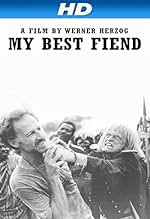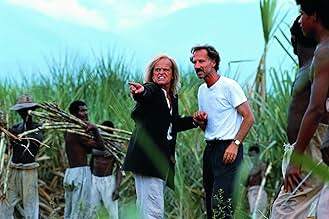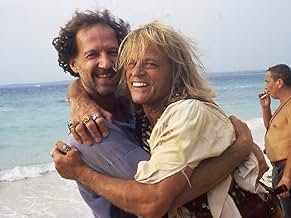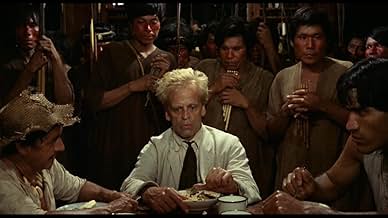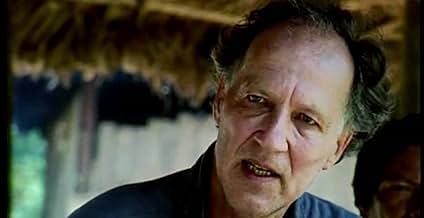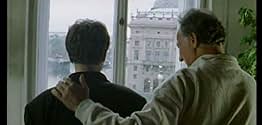PUNTUACIÓN EN IMDb
7,8/10
12 mil
TU PUNTUACIÓN
Añade un argumento en tu idiomaThe love-hate relationship between Werner Herzog and Klaus Kinski, the deep trust between the director and the actor, and their independently and simultaneously hatched plans to murder one a... Leer todoThe love-hate relationship between Werner Herzog and Klaus Kinski, the deep trust between the director and the actor, and their independently and simultaneously hatched plans to murder one another.The love-hate relationship between Werner Herzog and Klaus Kinski, the deep trust between the director and the actor, and their independently and simultaneously hatched plans to murder one another.
- Premios
- 1 premio y 2 nominaciones en total
Klaus Kinski
- Self
- (metraje de archivo)
Guillermo Ríos
- Self
- (metraje de archivo)
Andrés Vicente
- Self
- (metraje de archivo)
Paul Hittscher
- Self
- (metraje de archivo)
Mick Jagger
- Self - Wilbur
- (metraje de archivo)
Thomas Mauch
- Self
- (metraje de archivo)
Jason Robards
- Fitzcarraldo
- (metraje de archivo)
Walter Saxer
- Self
- (metraje de archivo)
Argumento
¿Sabías que...?
- CuriosidadesIn some footage of one of his notorious on-set flare-ups, Klaus Kinski yells at Werner Herzog that he's "a dwarf director!" This apparently random insult is a specific reference to Herzog's movie También los enanos empezaron pequeños (1970).
- Citas
Werner Herzog: Every grey hair on my head, I call Kinski.
Reseña destacada
I can't help but like Klaus Kinski. Sure that's easy for me to say, having only encountered him on film, but despite (or probably because of) the madness, the anger and the raving, there's something magnetic about the man. He's like no other actor out there. No one else was so crazy, so passionate and so captivating. He was certainly one of a kind.
However, despite my regard for him as an actor, I can't say that I envy those who had to work with him. Raving fits, shootings and murder plots aren't par for the course when it comes to the majority of movie shoots. Hell, they're not normal by any standards. But then again, Klaus Kinski and Werner Herzog are far from ordinary people. Both had their madness one explicit and one masked and both went to extraordinary lengths to get what they wanted.
I think the piece in the film that best illustrated their shared madness was the story behind Kinski's 'autobiography'. Now to have biography that is largely fictional is nothing new, as people always rewrite their lives, but to have the person that you're insulting have you help insult them is rather extraordinary. It suggests a sadomasochism and a perversity in their relationship. But it also suggests a twisted affection. They hated each other and yet loved each other. No matter how hard they tried they couldn't stop gravitating towards one another.
And it seems that this strange attraction was there from the beginning. After the amazing 'Jesus' footage, the film opens with Herzog reliving his early childhood experiences with Kinski. Just listening to the stuff is amazing. Apparently, before he moved into the halfway house that Herzog used to live in, Kinski used to live naked in an apartment that was filled with leaves. But then once he did move, he proceeded to ruin bathrooms, knock doors down, assault theatre critics ("I was not excellent! I was not extraordinary! I was monumental! I was epochal!"), and my favourite thing of all, rave at the woman who gave him free board, free food, and who did his laundry, for not ironing his shirts neatly enough. The man was a maniac. Yet I can imagine the young Herzog watching these displays in awe. If only someone could harness this energy.
Well, as Herzog's films prove, he certainly harnessed it. But as you'd expect, it was never smooth sailing. Kinski continually caused havoc on set and the bizarre incidents piled up higher and higher. But although listening to Herzog recount these incidents is fascinating enough, the footage itself is amazing. We only get to see snippets of the 'Fitzcarraldo' documentary, but the 'mild' raving fit that is shown illustrates what Herzog was dealing with every day. Sheer madness! In the footage that is shown it's an argument over food, but it really could be anything. Indeed, Herzog often says that Kinski would erupt for the smallest of reasons. But to see Kinski in action is amazing. He's like an animal.
Yet despite the madness, the film also manages to convey Kinski's warmth. There's some wonderful footage at a film festival in America where Herzog and Kinski embrace and joke with one another. In light of what comes before it's really surprising, as it seems impossible to imagine such moments between the two. But when you see it you can't help but come to the conclusion that the two men really did have a deep affection for one another. As well as the hate, there was a lot of love between the two. I also loved the Pongo footage from the 'Fitzcarraldo' documentary. Again you get to see the kindness that Kinski possessed, as he bandages the camerman's hand.
But although the film reveals a lot about Kinski, Herzog still remains something of an enigma. It's clear that he loved and hated Kinski there's one scene where Herzog is talking to a photographer and he suddenly looks overwhelmingly sad, almost like a widower but we're never really allowed to get into his head. In fact, there's one bit where he says that Kinski thought that he was mad but he assures us that he's 'clinically sane'. But as he stands there, holding onto a tree, he does look quite mad. And for all we know he may well be, or may well have had his madness, as what sane person could tolerate Kinski's pestilence?
But mad or not, it doesn't matter. The films that Herzog and Kinski made together are amongst the best in the world, and Herzog's documentary is a captivating, amusing, disturbing, and ultimately, moving tribute to his colleague and friend. The final minutes, in particular, I loved.
However, despite my regard for him as an actor, I can't say that I envy those who had to work with him. Raving fits, shootings and murder plots aren't par for the course when it comes to the majority of movie shoots. Hell, they're not normal by any standards. But then again, Klaus Kinski and Werner Herzog are far from ordinary people. Both had their madness one explicit and one masked and both went to extraordinary lengths to get what they wanted.
I think the piece in the film that best illustrated their shared madness was the story behind Kinski's 'autobiography'. Now to have biography that is largely fictional is nothing new, as people always rewrite their lives, but to have the person that you're insulting have you help insult them is rather extraordinary. It suggests a sadomasochism and a perversity in their relationship. But it also suggests a twisted affection. They hated each other and yet loved each other. No matter how hard they tried they couldn't stop gravitating towards one another.
And it seems that this strange attraction was there from the beginning. After the amazing 'Jesus' footage, the film opens with Herzog reliving his early childhood experiences with Kinski. Just listening to the stuff is amazing. Apparently, before he moved into the halfway house that Herzog used to live in, Kinski used to live naked in an apartment that was filled with leaves. But then once he did move, he proceeded to ruin bathrooms, knock doors down, assault theatre critics ("I was not excellent! I was not extraordinary! I was monumental! I was epochal!"), and my favourite thing of all, rave at the woman who gave him free board, free food, and who did his laundry, for not ironing his shirts neatly enough. The man was a maniac. Yet I can imagine the young Herzog watching these displays in awe. If only someone could harness this energy.
Well, as Herzog's films prove, he certainly harnessed it. But as you'd expect, it was never smooth sailing. Kinski continually caused havoc on set and the bizarre incidents piled up higher and higher. But although listening to Herzog recount these incidents is fascinating enough, the footage itself is amazing. We only get to see snippets of the 'Fitzcarraldo' documentary, but the 'mild' raving fit that is shown illustrates what Herzog was dealing with every day. Sheer madness! In the footage that is shown it's an argument over food, but it really could be anything. Indeed, Herzog often says that Kinski would erupt for the smallest of reasons. But to see Kinski in action is amazing. He's like an animal.
Yet despite the madness, the film also manages to convey Kinski's warmth. There's some wonderful footage at a film festival in America where Herzog and Kinski embrace and joke with one another. In light of what comes before it's really surprising, as it seems impossible to imagine such moments between the two. But when you see it you can't help but come to the conclusion that the two men really did have a deep affection for one another. As well as the hate, there was a lot of love between the two. I also loved the Pongo footage from the 'Fitzcarraldo' documentary. Again you get to see the kindness that Kinski possessed, as he bandages the camerman's hand.
But although the film reveals a lot about Kinski, Herzog still remains something of an enigma. It's clear that he loved and hated Kinski there's one scene where Herzog is talking to a photographer and he suddenly looks overwhelmingly sad, almost like a widower but we're never really allowed to get into his head. In fact, there's one bit where he says that Kinski thought that he was mad but he assures us that he's 'clinically sane'. But as he stands there, holding onto a tree, he does look quite mad. And for all we know he may well be, or may well have had his madness, as what sane person could tolerate Kinski's pestilence?
But mad or not, it doesn't matter. The films that Herzog and Kinski made together are amongst the best in the world, and Herzog's documentary is a captivating, amusing, disturbing, and ultimately, moving tribute to his colleague and friend. The final minutes, in particular, I loved.
- Ricky_Roma__
- 21 jun 2005
- Enlace permanente
Selecciones populares
Inicia sesión para calificar y añadir a tu lista para recibir recomendaciones personalizadas
- How long is My Best Fiend?Con tecnología de Alexa
Detalles
- Fecha de lanzamiento
- Países de origen
- Idiomas
- Títulos en diferentes países
- My Best Fiend
- Localizaciones del rodaje
- Empresas productoras
- Ver más compañías en los créditos en IMDbPro
Taquilla
- Recaudación en Estados Unidos y Canadá
- 95.612 US$
- Fin de semana de estreno en EE. UU. y Canadá
- 7677 US$
- 7 nov 1999
Contribuir a esta página
Sugerir un cambio o añadir el contenido que falta

Principal laguna de datos
By what name was Mi enemigo íntimo (1999) officially released in India in English?
Responde

